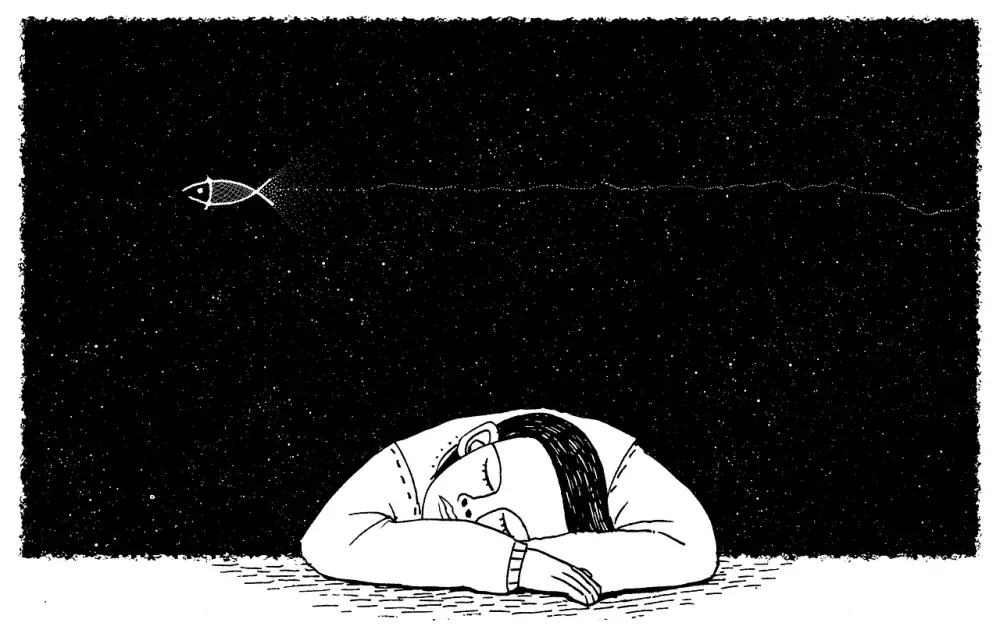When the body sleeps but the mind is trapped: causes and solutions to sleep paralysis

Sleep paralysis is a condition in which a person wakes from a deep sleep but is unable to move or speak. This condition is usually accompanied by a feeling of heaviness in the chest and fear. Up to 50% of the population will experience sleep paralysis during their lifetime and in many cases it is a very frightening experience. Although sleep paralysis is not medically dangerous, it can negatively affect the quality of sleep and lead to fatigue and insomnia. In this article, we take a closer look at the meaning of sleep paralysis and how it can be treated.
Definition of sleep paralysis
Sleep paralysis is a condition in which there is paralysis of the body at the time before falling asleep or upon waking. During sleep paralysis, a person is unable to move or speak, although they may be fully aware of their surroundings. This condition usually lasts for several minutes and may be accompanied by hallucinations or a feeling of heaviness in the chest. Although this is a relatively common phenomenon - up to 40% of the population suffers from it - it can be very uncomfortable and distressing at the same time for many people.
Causes of sleep paralysis
Sleep paralysis is a condition in which an individual is awake but unable to move or speak. The causes of sleep paralysis are varied. One of the main causes tends to be REM sleep dysfunction, where there is spasmodic muscle contraction and the individual remains virtually paralyzed. Other factors that can cause sleep paralysis include disruption of the sleep biorhythm (e.g. due to night work), chronic stress or anxiety, or the use of certain medications. However, heredity also appears to have an effect on the development of the disorder.
Sleep paralysis symptoms
Sleep paralysis is a condition that occurs during sleep and causes a temporary loss of the ability to move and speak. This condition can last for mere seconds, but can sometimes last for several minutes. The most typical symptoms include a feeling of heaviness in the chest, fear, hallucinations and a frozen body. In some cases, there may also be pain in the muscles or joints. Although sleep paralysis is an unpleasant experience, it is not a serious health problem and cannot be treated in any particular way. However, there are some methods of prevention that can reduce the risk of developing sleep paralysis, such as good nutrition or regular physical activity.
Diagnosis of sleep paralysis
Sleep paralysis is a neurological disorder in which there is a temporary loss of muscle movement between sleep and wakefulness. This disease can be very frightening because during paralysis, a person remains fully conscious but is unable to move or speak. Diagnosis of sleep paralysis is based on clinical signs and examination of sleep cycles using polysomnography. During this study, brain activity, muscle tone and eye movements during sleep are measured. Patients diagnosed with sleep paralysis should be reviewed for family history and associated factors such as stress or anxiety. Lifestyle changes such as regular sleep patterns or stress reduction are recommended in the treatment of this condition. In some cases, anxiety-reducing medications or antidepressants may also be used.
Treatment options for sleep paralysis
Sleep paralysis is a condition that affects many people. During this episode, a person wakes up and realizes that he or she is unable to move or speak even though he or she is conscious. This affects their daily life and can cause stress and anxiety.
There are several treatment options for sleep paralysis, including lifestyle changes, psychotherapy and drug therapy. Lifestyle changes include, for example, regular physical activity, reducing stress and anxiety and following a regular sleep schedule.
Psychotherapy can help people with ongoing problems associated with sleep paralysis. Exercises in breathing techniques or relaxation therapy are useful for managing anxious feelings.
Pharmacotherapy involves the use of anxiety-reducing medications or hypnotics to achieve deeper sleep. However, these medications should not be used for prolonged periods of time due to potential side effects.
Every person is different and it also depends on the severity of sleep paralysis, so it is important to consult a doctor before any treatment.
Sleep paralysis prevention
Sleep paralysis is a condition in which there is a temporary loss of body movement during sleep. Many people experience this disorder and it can be very frightening. However, there are some preventative measures that can reduce the likelihood of developing sleep paralysis.
The first step is maintaining a regular sleep rhythm. If you have irregular sleep patterns, it can lead to stress and tension, causing high levels of stress-related hormones in the body. This can then contribute to the onset of sleep paralysis.
Another preventative measure is limiting stress and anxiety. Practicing relaxation techniques such as yoga or meditation can help reduce stress and anxiety, thereby preventing the onset of sleep paralysis.
Finally, it is important to maintain a healthy lifestyle. This means regular physical activity, a balanced diet and adequate rest. This also helps to reduce the risk of developing the disorder.
Because the causes of sleep paralysis are not clearly defined, it is not possible to completely reverse it. However, the following preventive measures may be useful in reducing the risk of developing the condition and improving the quality of sleep as a whole.
Recommendations for sleep paralysis sufferers
Recommendations for sleep paralysis sufferers include several measures that can help minimize the anxiety and stress associated with this condition. One of the most important recommendations is to maintain a regular sleep schedule, which means going to bed and getting up at the same time every day. It's also important to minimize stress and anxiety before bedtime, for example, by relaxing, meditating or doing yoga.
Another recommendation is to avoid alcohol and caffeine consumption before bedtime. These types of stimulants can negatively affect sleep quality and worsen sleep paralysis symptoms. It is also important to provide a comfortable sleep environment free of distractions such as noisy surroundings or lighting.
Finally, other therapies such as medical hypnosis or cognitive behavioural therapy may be helpful. These therapies can help relieve anxiety and stress associated with conditions such as sleep paralysis and lead to better, more restful sleep.
Sleep paralysis is a very frightening experience for many people. This disease manifests itself by the person being awakened from sleep to a state where they cannot move or speak, even though they are aware of their surroundings. This state can last from a few seconds to several minutes and is often accompanied by hallucinations.
Even if it is a harmless condition, sleep paralysis can cause severe anxiety or even panic attacks. It is therefore important not to neglect the symptoms and to seek professional help in time. Today, there are a number of options to speed up the treatment of this condition and get rid of the unpleasant symptoms.
Resources
Sleep paralysis is a condition that occurs during sleep when the body cannot move and the patient cannot speak. It can be a frightening experience as the person becomes aware of his or her inability to respond to environmental stimuli. There are several different theories about what causes sleep paralysis, but the sources are still unclear. Some experts believe it may be caused by insufficient amounts of the neurotransmitter GABA in the brain, while others claim it is linked to REM stage sleep disorders. Currently, there are no specific medications or treatments for this sleep disorder and people usually have to learn to tolerate the condition.
Published: 18. 10. 2023
Category: Health



